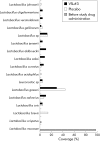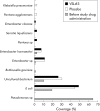Bacterial and fungal microbiota in relation to probiotic therapy (VSL#3) in pouchitis
- PMID: 16401690
- PMCID: PMC1856240
- DOI: 10.1136/gut.2005.078303
Bacterial and fungal microbiota in relation to probiotic therapy (VSL#3) in pouchitis
Abstract
Background: The intestinal microbiota plays a critical role in the pathophysiology of pouchitis, a major complication after ileal pouch anal anastomosis in patients with ulcerative colitis. Recently, controlled trials have demonstrated that probiotics are effective in maintenance of remission in pouchitis patients. However, the mechanism by which therapy with probiotics works remains elusive. This study explores the role of the bacterial and fungal flora in a controlled trial for maintenance of remission in pouchitis patients with the probiotic VSL#3 compound.
Methods: The mucosa associated pouch microbiota was investigated before and after therapy with VSL#3 by analysis of endoscopic biopsies using ribosomal DNA/RNA based community fingerprint analysis, clone libraries, real time polymerase chain reaction (PCR), and fluorescence in situ hybridisation. Patients were recruited from a placebo controlled remission maintenance trial with VSL#3.
Results: Patients who developed pouchitis while treated with placebo had low bacterial and high fungal diversity. Bacterial diversity was increased and fungal diversity was reduced in patients in remission maintained with VSL#3 (p = 0.001). Real time PCR experiments demonstrated that VSL#3 increased the total number of bacterial cells (p = 0.002) and modified the spectrum of bacteria towards anaerobic species. Taxa specific clone libraries for Lactobacilli and Bifidobacteria showed that the richness and spectrum of these bacteria were altered under probiotic therapy.
Conclusions: Probiotic therapy with VSL#3 increases the total number of intestinal bacterial cells as well as the richness and diversity of the bacterial microbiota, especially the anaerobic flora. The diversity of the fungal flora is repressed. Restoration of the integrity of a "protective" intestinal mucosa related microbiota could therefore be a potential mechanism of probiotic bacteria in inflammatory barrier diseases of the lower gastrointestinal tract.
Conflict of interest statement
Conflict of interest: None declared.
References
-
- Madsen K L. The use of probiotics in gastrointestinal disease. Can J Gastroenterol 200115817–822. - PubMed
-
- Montaldo M, Arancio F, Izzi D.et al Probiotics: history, definition, requirements and possible therapeutic applications. Ann Ital Med Int 200217157–165. - PubMed
-
- Hart A L, Stagg A J, Frame M.et al The role of the gut flora in health and disease, and its modification as therapy. Aliment Pharmacol Ther 2002161383–1393. - PubMed
-
- Cremonimi E, Caro S, Santarelli L.et al Probiotics in antibiotic associated diarrhoea. Dig Liver Dis 200234S78–S80. - PubMed
Publication types
MeSH terms
Substances
LinkOut - more resources
Full Text Sources
Medical









